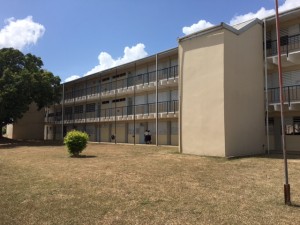Safe Havens International Executive Director Michael Dorn presented at a national conference on school violence in Trinidad-Tobago last week and wrote this blog while on the road. We are posting it this week since we recently did a web redesign and had a delay in making new posts.
I have had a wonderful experience the past few days working in Port of Spain, Trinidad. I had the honor to serve as the keynote speaker for the first national conference on school safety and security held in Trinidad – Tobago today. The Ministry of Education and the CORE Foundation were able to arrange for a Trinidad Police Officer assigned to my security detail and the Director of the CORE Foundation to accompany me for site visits of two area high schools that have had recent security incidents. These incidents included a double homicide where two victims were killed as they left their high school at the end of the school day. I had been provided with quite a few news articles as background information prior to my arrival. As we have seen in many cases in the U.S., the news articles turned out to be alarmist and highly inaccurate. Trinidad – Tobago has a national homicide rate of 28 victims per 100,000 people in contrast to the U.S. rate of only 3.2 per 100,000 and has intensive gang activity. In large cities like Port of Spain, it is not uncommon to see police officers patrolling in groups of three while carrying fully automatic tactical rifles and sub-machine guns. At the same time, no one I have spoken to during this trip could provide any examples of anyone being murdered on school property. As with many cases in England, Vietnam, South Africa and a number of countries where schools are typically completely fenced in, students have been murdered as they left the front gate of their schools at the end of the school day.
While I am not trying to imply that these types of murders are anything but tragic, it is almost astounding to me that to-date at least, no student or intruder has murdered anyone on a K12 campus property. While it is likely that these types of incident will occur in Trinidad in the future, it is noteworthy that there have not been a number of such incidents already. As with alarmist media and social media descriptions in the U.S., media accounts in Trinidad paint a picture of absolute chaos in K12 schools. While schools in Trinidad – Tobago, like their counterparts in many other countries, have their share of violence, bullying, vandalism and other social ills, the media accounts appear to be just as inaccurate and inflammatory as those in the U.S. press.
There are striking differences in the way schools in Trinidad operate in relation to their U.S. counterparts. For example, teachers rotate to different classrooms in contrast to the U.S. where students move between locations during passing times. We have observed this practice in other countries such as Vietnam. While U.S. school officials face challenges with student supervision during passing times, students in classrooms in Trinidad – Tobago are often left unattended by an adult as teachers rotate between their rooms. This has resulted in some upsetting portable phone videos of students being assaulted in their classrooms by other students. We recently observed a similarly troubling video where a child was severely beaten in a Vietnamese school. Of course, there have also been many similarly troubling videos of students being attacked in U.S. and British schools. As we have said many times, school safety challenges occur in every country our analysts have visited.
The CORE Foundation, the Ministry of Education and other sponsoring organizations did a superb job of planning for the event. They also arranged for site visits to schools so I could become more familiar with how schools in Trinidad – Tobago operate to help me tailor the presentation so the information would be more practical for participants. I found that there are some excellent practices and success stories in Trinidad – Tobago. I was deeply impressed with the other presenters who all shared very pertinent and current strategies. I also found the many professionals I had the opportunity to interact with were caring, competent and passionate advocates for the children. I have already been asked to present again in Trinidad – Tobago, and feel honored and blessed to be asked to return.

